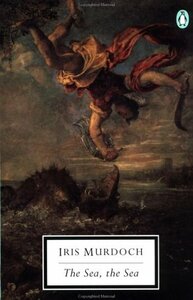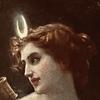Take a photo of a barcode or cover
I have very mixed feelings about this book, so let me try to capture them as follows:
The good: The writing style is engaging and beautiful in most parts. The characters also enter and exit the plot at convenient, if not sharp, moments during the story. Very elaborate and beautiful descriptions of the sea, the state of human nature, the fragility of human feelings, the sky, morality and all possible meals that the characters have consumed.
The bad:
1. The protagonist (and narrator) is downright insufferable. Charles Arrowby is sensitive to the point where even the slightest of events (the possibility that someone has left a letter behind) triggers the "unfolding of vast emotional vistas" (i.e. it must be intentional and what could it mean and so on). Yet, he despises any expression of these feelings as vulgar, chaotic, disgusting and abuses the word "horrible" in describing anything that pertains to the things he seems to innately desire. I skipped several portions of his emotional raving and ranting, because it is one thing to express these in private (and indeed the novel is his diary), but to take out emotional tantrums on others to the point where it seems to come from a place of malice (intentionally wrecking joy and marriages) is not expected of a grown adult person. If anything, this novel left me with very little sympathy for the character and so all of his lessons have been wasted on me.
2. The book is about everything and nothing at the same time. Essentially it is about human relationships, but also it is about everything ranging from homosexuality, disturbed childhoods, sibling rivalry, jealousy, "possessive" love, battered domesticity, Buddhism, singing, the sea and its inhabitants, parenthood, celebrity lifestyles, boundaries between superstition and religion, loving through hate and so on. There are a great many philosophical discussions the book tries to have, primarily via the character of James, but given the otherwise emotional maturity of an infant of the protagonist, it seems a forced and particularly stupid undertaking on James' behalf to reason with his cousin. Also, "oriental mysticism".
3.The whole central plot with the narrator, Hartley and Ben is a textbook example of a battered self-flagellating woman who is trapped between two keepers, one who has trained her for years and the other who is hell-bent on disrupting everything for a childhood ideal of "one true love". Also, the author's treatment of Hartley as a poor frightened child, and not as a woman who, while possibly abused, was still capable of acting according to her intentions, made everything worse for me. If someone asks to be sent back home after 4 days, they do not want to stay with you. It is literally just that simple, but no here we are enduring obscenely long chapters about "finding a thin stream of communication" even though she purportedly loves him. Can we also please talk about why the narrator has to mention her breasts almost every time he encounters her? Particularly if his love for her is so pure and holy and all-consuming? While I know that this is taken care of towards the end, and Charles finally realizes he had an unhealthy obsession, he dragged us through that "horrible/terrible" journey with him and I do not think his "suffering" does not take away the fact that he still got away with very few consequences.
4. The women of this book are all tedious. I probably only like Rosina a little bit, and if only because she had the gumption to go after and destroy what wrecked her marriage and her unborn baby. I imagine that is how the protagonist feels of them, but only once after he has obsessed about them, made them his muse, suffered his requisite artistic angst and then found another one. Liz, Gilbert and Peregrine make no sense to me particularly. WHY in the world are all of these people so loving of this reprehensible self-important sack of emotional tantrums? Even if we assume that Liz and Gilbert are happy in their polyamorous arrangement, why in the world should it be with this hideous Charles Arrowby?
The good: The writing style is engaging and beautiful in most parts. The characters also enter and exit the plot at convenient, if not sharp, moments during the story. Very elaborate and beautiful descriptions of the sea, the state of human nature, the fragility of human feelings, the sky, morality and all possible meals that the characters have consumed.
The bad:
1. The protagonist (and narrator) is downright insufferable. Charles Arrowby is sensitive to the point where even the slightest of events (the possibility that someone has left a letter behind) triggers the "unfolding of vast emotional vistas" (i.e. it must be intentional and what could it mean and so on). Yet, he despises any expression of these feelings as vulgar, chaotic, disgusting and abuses the word "horrible" in describing anything that pertains to the things he seems to innately desire. I skipped several portions of his emotional raving and ranting, because it is one thing to express these in private (and indeed the novel is his diary), but to take out emotional tantrums on others to the point where it seems to come from a place of malice (intentionally wrecking joy and marriages) is not expected of a grown adult person. If anything, this novel left me with very little sympathy for the character and so all of his lessons have been wasted on me.
2. The book is about everything and nothing at the same time. Essentially it is about human relationships, but also it is about everything ranging from homosexuality, disturbed childhoods, sibling rivalry, jealousy, "possessive" love, battered domesticity, Buddhism, singing, the sea and its inhabitants, parenthood, celebrity lifestyles, boundaries between superstition and religion, loving through hate and so on. There are a great many philosophical discussions the book tries to have, primarily via the character of James, but given the otherwise emotional maturity of an infant of the protagonist, it seems a forced and particularly stupid undertaking on James' behalf to reason with his cousin. Also, "oriental mysticism".
3.The whole central plot with the narrator, Hartley and Ben is a textbook example of a battered self-flagellating woman who is trapped between two keepers, one who has trained her for years and the other who is hell-bent on disrupting everything for a childhood ideal of "one true love". Also, the author's treatment of Hartley as a poor frightened child, and not as a woman who, while possibly abused, was still capable of acting according to her intentions, made everything worse for me. If someone asks to be sent back home after 4 days, they do not want to stay with you. It is literally just that simple, but no here we are enduring obscenely long chapters about "finding a thin stream of communication" even though she purportedly loves him. Can we also please talk about why the narrator has to mention her breasts almost every time he encounters her? Particularly if his love for her is so pure and holy and all-consuming? While I know that this is taken care of towards the end, and Charles finally realizes he had an unhealthy obsession, he dragged us through that "horrible/terrible" journey with him and I do not think his "suffering" does not take away the fact that he still got away with very few consequences.
4. The women of this book are all tedious. I probably only like Rosina a little bit, and if only because she had the gumption to go after and destroy what wrecked her marriage and her unborn baby. I imagine that is how the protagonist feels of them, but only once after he has obsessed about them, made them his muse, suffered his requisite artistic angst and then found another one. Liz, Gilbert and Peregrine make no sense to me particularly. WHY in the world are all of these people so loving of this reprehensible self-important sack of emotional tantrums? Even if we assume that Liz and Gilbert are happy in their polyamorous arrangement, why in the world should it be with this hideous Charles Arrowby?
challenging
dark
reflective
slow-paced
Plot or Character Driven:
Character
Strong character development:
No
Loveable characters:
No
Diverse cast of characters:
No
Flaws of characters a main focus:
Yes
challenging
funny
tense
slow-paced
Plot or Character Driven:
A mix
Strong character development:
Complicated
Loveable characters:
No
Diverse cast of characters:
No
Flaws of characters a main focus:
Yes
challenging
dark
emotional
mysterious
reflective
sad
slow-paced
Plot or Character Driven:
Character
Strong character development:
Yes
Loveable characters:
Complicated
Diverse cast of characters:
No
Flaws of characters a main focus:
Yes
emotional
mysterious
reflective
slow-paced
Plot or Character Driven:
Character
Strong character development:
Yes
Loveable characters:
Complicated
Diverse cast of characters:
Yes
Flaws of characters a main focus:
Yes
murdoch is simply too wonderful!!! pages and pages of meandering, unnecessary descriptions and yet I didn’t find myself bored even once. plot was a bit ‘soap opera’ at times but such is typical for her writing. :)
Graphic: Misogyny, Toxic relationship, Kidnapping
A really well written and engaging, I loved this book to begin but it faded over time, drawing out and getting lost in itself. But it rallied again towards the end. Overall a great book and worth the time.
dark
emotional
funny
informative
inspiring
relaxing
medium-paced
Plot or Character Driven:
Character
Strong character development:
Yes
Loveable characters:
Yes
Diverse cast of characters:
Yes
Flaws of characters a main focus:
Yes
Love the story telling of Iris Murdoch. The main character is a retired playwrite/actor and the book revolves around events which unfold when he moves to a remote house by the coast.
reflective
slow-paced
Plot or Character Driven:
Character
Strong character development:
Complicated
Loveable characters:
No
Diverse cast of characters:
Yes
Flaws of characters a main focus:
Yes
I hated the main character so it was difficult to continue reading, but it is beautifully well written.
Loved the start, lost me toward the middle, found me, lost me again, really enjoyed the end. A bit drawn out, but some interesting ideas about people and relationships.




